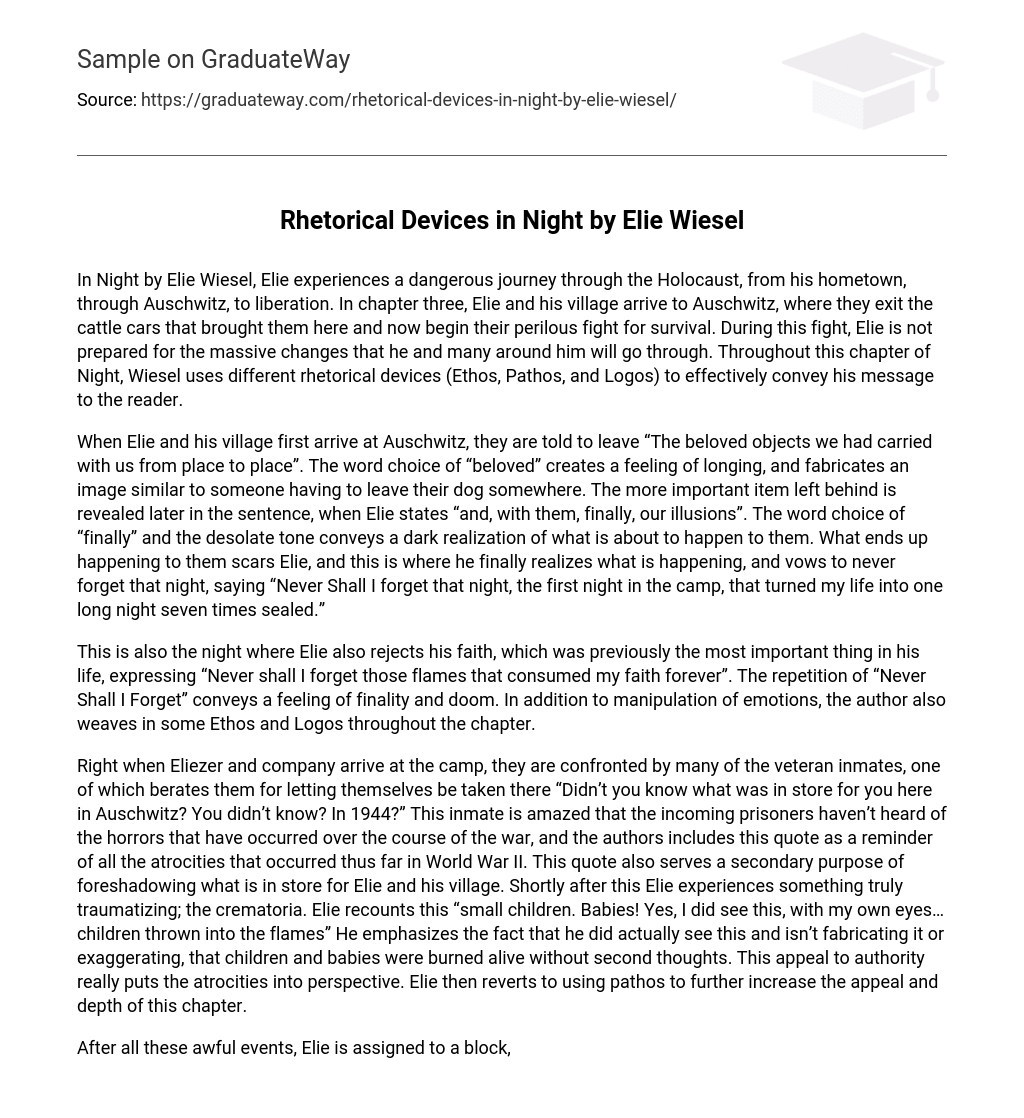In Night by Elie Wiesel, Elie experiences a dangerous journey through the Holocaust, from his hometown, through Auschwitz, to liberation. In chapter three, Elie and his village arrive to Auschwitz, where they exit the cattle cars that brought them here and now begin their perilous fight for survival. During this fight, Elie is not prepared for the massive changes that he and many around him will go through. Throughout this chapter of Night, Wiesel uses different rhetorical devices (Ethos, Pathos, and Logos) to effectively convey his message to the reader.
When Elie and his village first arrive at Auschwitz, they are told to leave “The beloved objects we had carried with us from place to place”. The word choice of “beloved” creates a feeling of longing, and fabricates an image similar to someone having to leave their dog somewhere. The more important item left behind is revealed later in the sentence, when Elie states “and, with them, finally, our illusions”. The word choice of “finally” and the desolate tone conveys a dark realization of what is about to happen to them. What ends up happening to them scars Elie, and this is where he finally realizes what is happening, and vows to never forget that night, saying “Never Shall I forget that night, the first night in the camp, that turned my life into one long night seven times sealed.”
This is also the night where Elie also rejects his faith, which was previously the most important thing in his life, expressing “Never shall I forget those flames that consumed my faith forever”. The repetition of “Never Shall I Forget” conveys a feeling of finality and doom. In addition to manipulation of emotions, the author also weaves in some Ethos and Logos throughout the chapter.
Right when Eliezer and company arrive at the camp, they are confronted by many of the veteran inmates, one of which berates them for letting themselves be taken there “Didn’t you know what was in store for you here in Auschwitz? You didn’t know? In 1944?” This inmate is amazed that the incoming prisoners haven’t heard of the horrors that have occurred over the course of the war, and the authors includes this quote as a reminder of all the atrocities that occurred thus far in World War II. This quote also serves a secondary purpose of foreshadowing what is in store for Elie and his village. Shortly after this Elie experiences something truly traumatizing; the crematoria. Elie recounts this “small children. Babies! Yes, I did see this, with my own eyes… children thrown into the flames” He emphasizes the fact that he did actually see this and isn’t fabricating it or exaggerating, that children and babies were burned alive without second thoughts. This appeal to authority really puts the atrocities into perspective. Elie then reverts to using pathos to further increase the appeal and depth of this chapter.
After all these awful events, Elie is assigned to a block, where the man in charge tries to encourage the prisoners with words like “keep faith” and “be kind to each other”. Elie reflects that that “Those were the first human words”. This imparts a feeling, or of hope, that maybe everything will work out. This quote also serves as a reminder of how dreary the situation is, with the human words being such a notable event. After this, Elie settles into the camp (or as settled as you can be under the constant threat of death and hard labor) and has a moment where he and his father contemplate the fate of Elie’s mother and sisters, comforting each other by saying that they were probably fine.
However, neither of them really believe that and are merely saving face for the other’s benefit, evidenced by “How we would have liked to believe that. We pretended, for what if one of us still did believe?” The invokes a feeling of resignation, as both Elie and his father know what has likely befallen their family, but they pretend they believed just in case the other did actually believe. This also presents a feeling of despair as Elie foreshadows what may be in store for him and his father.
In chapter three of Night by Elie Wiesel, Elie uses the rhetorical devices of Ethos, Pathos, and Logos. The author uses these devices to enthrall the audience and appeal the reader’s emotions. After using these devices, Elie has set the audience up to continue to have powerful emotions throughout the rest of the memoir, reflecting how Elie’s emotions will change throughout the rest of his journey.





